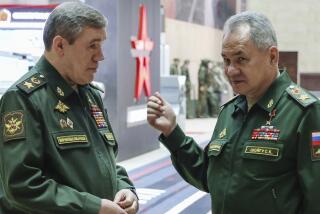Milosevic Hid Kosovo War Crimes, Yugoslavs Allege
- Share via
SKOPJE, Macedonia — Yugoslav authorities Friday for the first time accused former President Slobodan Milosevic of covering up war crimes committed in Kosovo.
“Milosevic ordered former Interior Minister Vlajko Stojiljkovic to take measures to eliminate all the traces which could lead to any evidence of crimes committed” in Kosovo, Dragan Karleusa, a Serbian official in charge of efforts against organized crime, told a televised news conference in Belgrade, the Yugoslav and Serbian capital.
The announcement, linked to the discovery in 1999 of a corpse-filled truck in the Danube River, marked the first time that the new democratic authorities in Belgrade have accused Milosevic of involvement in war crimes. The statement could pave the way for his trial in Yugoslavia or in The Hague.
Police suspect that the truck incident was part of an effort, code-named “Depth 2,” to dispose of slain Kosovo civilians, Karleusa said.
Serbian Interior Minister Dusan Mihajlovic, asked whether he expects war crimes charges to be filed against Milosevic in Yugoslavia, replied: “When we finish the investigation, we will file criminal charges. For now it’s clear that this was a case of removing evidence of criminal acts.” Serbia is the dominant republic of Yugoslavia.
The allegation stemmed from an investigation into the case of a refrigerator truck filled with bodies believed to be those of ethnic Albanians from the Serbian province of Kosovo, Karleusa said. At a March 1999 meeting attended by Stojiljkovic and top police commanders, Milosevic ordered the removal of civilian corpses that could be subject to “possible investigation by the Hague tribunal,” Karleusa said.
Among those present at the meeting was the former state security chief, Rade Markovic, Karleusa added. Markovic is imprisoned for allegedly causing the deaths of four aides to Vuk Draskovic in an unsuccessful assassination attempt on the former opposition leader.
A U.N. tribunal in The Hague has charged Milosevic with war crimes against ethnic Albanians during a 1999 crackdown in Kosovo, but Belgrade authorities have been split over the issue of handing him over. A law is being drafted that would permit, if local courts approve, the extradition of suspects to The Hague.
“My guess is this whole case will be exploited by the government either to get some public support for a trial here [in Belgrade] or to hand Milosevic to The Hague,” Stojan Cerovic, political columnist and board chairman of the weekly magazine Vreme, said in a phone interview.
The truck was pulled from the Danube in 1999 with more than 50 bodies inside, but Milosevic associates declared the incident a state secret and ordered a halt to any investigation, Karleusa said. The bodies were taken to a still-unknown location, he said.
The story of the refrigerator truck broke in Belgrade media this month. A diver who helped salvage the truck has been quoted as saying that the bodies included women, children and elderly men.
The accusations against Milosevic may help deepen the Serbian public’s understanding of what happened during the wars that accompanied the breakup of the Yugoslav federation in the 1990s during the ex-president’s rule.
“Especially if they have evidence, it’s much better to start discussion of war crimes as ‘war crimes committed under Milosevic’s command,’ ” said Srdjan Bogosavljevic, director of the Strategic Marketing and Media Research Institute, which has conducted polls on Serbs’ attitudes about responsibility for wartime events.
Milosevic is already imprisoned, facing charges of corruption and abuse of power. Adding war crimes charges would be an important and positive step, Bogosavljevic said in a telephone interview.
Cerovic, the columnist, said most Serbs are still in an “evasive mood” on the issue of war crimes. “They will give all sorts of excuses: ‘Yes, Albanians got killed, but Serbs got killed too. . . . We are not ready to feel guilty for something like that,’ ” he said.
“Apparently Milosevic’s police and army did commit some crimes,” Cerovic added. “What’s the scale of that? I don’t know, really. I personally don’t believe it was a story of something like you can compare with World War II Nazi crimes.”
Another factor in public reaction to revelations about crimes possibly committed under Milosevic, Cerovic said, is that most Serbs view the indictment by the International Criminal Tribunal for the Former Yugoslavia in The Hague as politically motivated.
“NATO bombing [in 1999] did encourage those thugs on the Serb side,” he added. “They couldn’t reach NATO planes, so they took revenge on the Albanians. The story is very dirty on many sides.”
Cerovic said he believes that a war crimes trial for Milosevic in Belgrade would have a much healthier impact on Serbian society than a trial in The Hague.
More to Read
Sign up for Essential California
The most important California stories and recommendations in your inbox every morning.
You may occasionally receive promotional content from the Los Angeles Times.













